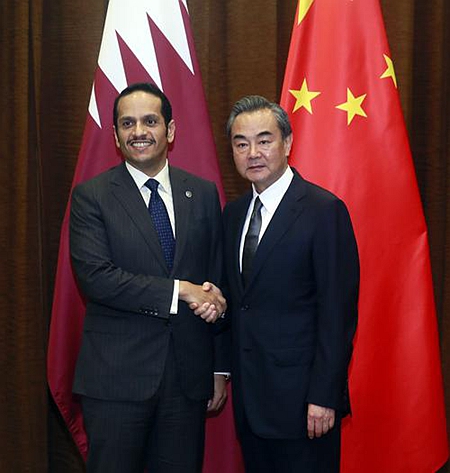China – the impartial mediator in the ME
- By Kyle Calandra
 0 Comment(s)
0 Comment(s) Print
Print E-mail China.org.cn, July 25, 2017
E-mail China.org.cn, July 25, 2017
|
|
|
Chinese Foreign Minister Wang Yi meets with his Qatari counterpart Sheikh Mohammed bin Abdulrahman Al Thani in Beijing on July 20, 2017. [File photo] |
According to an article in the South China Morning Post (SCMP), Saudi Arabia, the UAE, Egypt and Bahrain recently cut ties with Qatar concerning the country's alleged support for terrorism and its close ties with Iran.
More specifically, reports in The National explained that Saudi Arabia, the UAE, Egypt and Bahrain not only severed relations with Qatar, but also cut air, sea and land routes with the country.
Responding to the complex and far-reaching nature of the dispute, the same article from SCMP revealed that China's Foreign Minister Wang Yi made an appeal for the peaceful settlement between the Gulf nations involved during his meetings with visiting ministers from Qatar on Wednesday and the United Arab Emirates (UAE) on Thursday, July 20.
Wang's meeting with UAE Minister of State Sultan Ahmed Al Jaber seemed to encourage speculation that China was seeking to help oversee the settlement of the multi-national dispute as a neutral mediator. Li Guofu, an Arab specialist from the China institute of International Studies, seemed to confirm the speculation, asserting "China has shown good timing in taking up a mediating role, as the two sides have been demonstrating a stronger will to negotiate."
The overall mediation process is being led by Kuwait, and has so far managed to convince Saudi Arabia, the UAE, Egypt and Bahrain to curtail their list of demands, lowering them from a total of 13 to six.
During his meeting with Qatar's Foreign Minister, Sheikh Mohammed bin Abdulrahman Al-Thani, Foreign Minister Wang conveyed China's support of Kuwait's efforts to mediate the dispute, saying that China is a good friend and partner with all Gulf countries, and is willing to play a constructive role in promoting peace and negotiations when needed.
On the back of Wang's comments, Li Guofu emphasized China's desire to avoid a partisan perspective and remain neutral in relation to the dispute as the country has strong economic ties with the many Gulf nations involved, adding, "Although China will continue to uphold the non-interference approach, it is in a suitable position ... to ease the tension because it has good relations with all the countries involved in the conflict."
It's no secret that countries outside the region have a vested economic interest in a peaceful resolution for the Gulf nations' dispute, with China benefitting from Saudi Arabia as its third-largest source of oil and Qatar representing its second-largest source of liquefied natural gas.
Looking past the obvious financial ramifications of the dispute, what's encouraging is not only the seemingly unobtrusive effort made by China to mediate the discussion and encourage peaceful negotiation, but the response from Al Jabar which might be viewed as a barometer of a shared Middle Eastern perspective regarding China's efforts.
According to China's Xinhua news agency, during Wang Yi's meeting with Al Jaber, he reaffirmed China's stance, admitting the country is "confident Gulf countries have the wisdom to resolve divergence and is willing to play a constructive role to help ease tensions according to the will of regional parties." Xinhua also quoted Al Jaber in praising China's "objective and impartial position" on affairs concerning the Gulf nations involved.
In this sense, Beijing has already succeeded in cultivating a mutual respect in its hopes for mediation.
Under President Xi Jinping, mutual benefit and win-win cooperation have been the twin pillars of China's foreign policy. If Beijing can encourage the shared sentiment for mutual cooperation among the Gulf nations as they continue to work towards a peaceful resolution in the days to come, the international community could be celebrating China's impartial mediation model as a success, and China could be celebrating the continued success of its regional relations with the many Gulf nations involved.
Having previously lived in Beijing working as a journalist and editor, Kyle Calandra is currently based in America reporting on Sino-U.S. Relations as a contributor for China.org.cn.
Opinion articles reflect the views of their authors only, not necessarily those of China.org.cn.







Go to Forum >>0 Comment(s)